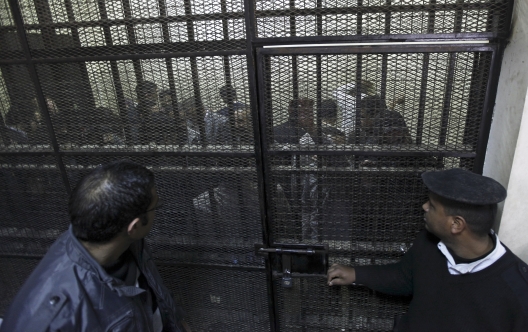 Authoritarian governments have always found human rights groups, labor associations, and political organizations a thorn in the side of effective domination over the public sphere. In Egypt, the situation is no different. Civil society groups face an ongoing threat from a draft law meant to reform nongovernmental institutions, but in reality place on them severe restrictions that limit their founding, funding, operations, and indeed, their very existence. Since the arrest in January 2013 and conviction in June 2013 of forty-three NGO workers for receiving illegal foreign funding, Egyptian authorities have placed civil society on notice. Many groups have since limited their activity to those less politically sensitive for fear of government retaliation. The clampdown on any form of dissent exacerbates this fear, leads to self-censorship, and derails progress towards and democratic and inclusive society.
Authoritarian governments have always found human rights groups, labor associations, and political organizations a thorn in the side of effective domination over the public sphere. In Egypt, the situation is no different. Civil society groups face an ongoing threat from a draft law meant to reform nongovernmental institutions, but in reality place on them severe restrictions that limit their founding, funding, operations, and indeed, their very existence. Since the arrest in January 2013 and conviction in June 2013 of forty-three NGO workers for receiving illegal foreign funding, Egyptian authorities have placed civil society on notice. Many groups have since limited their activity to those less politically sensitive for fear of government retaliation. The clampdown on any form of dissent exacerbates this fear, leads to self-censorship, and derails progress towards and democratic and inclusive society.
Elly Page, Legal Advisor with the Middle East and North Africa office of the International Center for Not-for-Profit Law (ICNL), outlines the history behind the draft NGO law and the various attempts at limiting the maneuverability of civil society. As she writes in her latest article on EgyptSource, “Another Assault on Civil Society in Egypt,” the release of the latest draft prompted twenty-nine Egyptian NGOs to sign a joint letter condemning the clear violation of domestic and international laws that protect the right to freedom of association. Page argues that despite the outcry, the political climate in Egypt increases the likelihood of the law’s passage.
Read “Another Assault on Civil Society in Egypt” for more details on EgyptSource.
Image: Photo: Activists, accused of working for unlicensed non-governmental organizations and receiving illegal foreign funds, stand in a cage during the opening of their trial in Cairo March 8, 2012.(Reuters/Mohamed Abd El Ghany)
